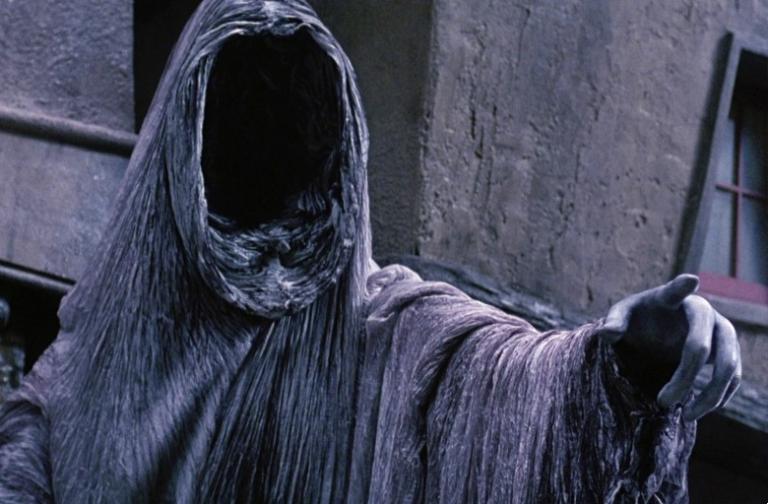Ebenezer Scrooge didn’t set out to be evil. The decision he made wasn’t a choice for immorality, but for amorality. Morality, he decided, was irrelevant to business and to success. It served only as a distraction from or an obstacle to his simply doing what business demanded be done.
Scrooge became a villain, in other words, because he started living as though categories like “villain” were unrealistic. A realistic view, he decided, meant setting aside irrelevant categories of right and wrong or of good and bad and just doing what would be most effective. He trained himself to stop worrying about “values” or sentimental morals so that he could focus more intently — more realistically — on interests.

And so Ebenezer Scrooge became a villain. He lived a long life in the amoral pursuit of his interests and died alone, unloved, and unmourned. Those he exploited did not remember him as an amoral realist but as a warped, cruel, evil man. And the only emotion any of them felt at his death was that “their hearts were lighter. The children’s faces … were brighter; and it was a happier house” because the wickedly amoral realist was dead and it seemed impossible that his successor would prove to be so merciless.
Happily for Scrooge — and even more happily for all of his victims and other neighbors — his inexorable doom is averted by a Dickens Ex Machina plot twist. He is given the hard grace of seeing his own future and his own unmourned death.
And that is what saves him. The first two ghosts, I suppose, helped soften him up, but their visions of joyful innocence and remorse aren’t enough to force him to his knees in repentance. That only happens with the visit of the third spirit who shows Scrooge that he will be remembered exactly as he deserves to be remembered.
It would be nice if real life worked like this story. The world would be a better place if otherworldly spirits troubled the sleep of mercilessly exploitative men and gave to them all a vision of the celebration destined to follow their inevitable death.
But it doesn’t work that way. The Spirits of Christmas aren’t coming with sweet dreams and nightmare visions to compel such men to repent. The only way to show them the inevitable misery of their Yet To Come is to show it to them now, in the waking world.
If we ever hope to see such men repent, we must give them the grace of speaking truthfully ill of the merciless, wicked, self-interested, “realist” dead so that they can see, in this lifetime, what the end of their lives will also mean to others.
Then, perhaps, maybe, they will understand that there is still time for them to change and to begin living and acting in a way that won’t make others’ hearts lighter, faces brighter, and houses happier upon the news of their death.
The following is a re-run from 2019, which was the last time I lost my patience with the nattering fools who imagine that it is good or useful or “respectable” somehow to refuse to speak ill of the wicked dead.
The duty of speaking ill of the dead
From Charles Dickens’ A Christmas Carol, “The Last of the Spirits”
The Spirit stopped beside one little knot of business men. Observing that the hand was pointed to them, Scrooge advanced to listen to their talk.
“No,” said a great fat man with a monstrous chin, “I don’t know much about it, either way. I only know he’s dead.”
“When did he die?” inquired another.
“Last night, I believe.”
“Why, what was the matter with him?” asked a third, taking a vast quantity of snuff out of a very large snuff-box. “I thought he’d never die.”
“God knows,” said the first, with a yawn.
“What has he done with his money?” asked a red-faced gentleman with a pendulous excrescence on the end of his nose, that shook like the gills of a turkey-cock.
“I haven’t heard,” said the man with the large chin, yawning again. “Left it to his company, perhaps. He hasn’t left it to me. That’s all I know.”
This pleasantry was received with a general laugh.
“It’s likely to be a very cheap funeral,” said the same speaker; “for upon my life I don’t know of anybody to go to it. Suppose we make up a party and volunteer?”
“I don’t mind going if a lunch is provided,” observed the gentleman with the excrescence on his nose. “But I must be fed, if I make one.”
Another laugh.
“Well, I am the most disinterested among you, after all,” said the first speaker, “for I never wear black gloves, and I never eat lunch. But I’ll offer to go, if anybody else will. When I come to think of it, I’m not at all sure that I wasn’t his most particular friend; for we used to stop and speak whenever we met. Bye, bye!”
The Spirit takes Scrooge off to hear another conversation between businessmen Scrooge knew personally. They are glibly unperturbed by news of his death. Then there’s the scene with the petty thieves fencing items stolen from his deathbed, and then this:
“If there is any person in the town, who feels emotion caused by this man’s death,” said Scrooge quite agonised, “show that person to me, Spirit, I beseech you!”
The Phantom spread its dark robe before him for a moment, like a wing; and withdrawing it, revealed a room by daylight, where a mother and her children were.
She was expecting some one, and with anxious eagerness; for she walked up and down the room; started at every sound; looked out from the window; glanced at the clock; tried, but in vain, to work with her needle; and could hardly bear the voices of the children in their play.
At length the long-expected knock was heard. She hurried to the door, and met her husband; a man whose face was careworn and depressed, though he was young. There was a remarkable expression in it now; a kind of serious delight of which he felt ashamed, and which he struggled to repress.
He sat down to the dinner that had been hoarding for him by the fire; and when she asked him faintly what news (which was not until after a long silence), he appeared embarrassed how to answer.
“Is it good?” she said, “or bad?”—to help him.
“Bad,” he answered.
“We are quite ruined?”
“No. There is hope yet, Caroline.”
“If he relents,” she said, amazed, “there is! Nothing is past hope, if such a miracle has happened.”
“He is past relenting,” said her husband. “He is dead.”
She was a mild and patient creature if her face spoke truth; but she was thankful in her soul to hear it, and she said so, with clasped hands. She prayed forgiveness the next moment, and was sorry; but the first was the emotion of her heart.
“What the half-drunken woman whom I told you of last night, said to me, when I tried to see him and obtain a week’s delay; and what I thought was a mere excuse to avoid me; turns out to have been quite true. He was not only very ill, but dying, then.”
“To whom will our debt be transferred?”
“I don’t know. But before that time we shall be ready with the money; and even though we were not, it would be a bad fortune indeed to find so merciless a creditor in his successor. We may sleep to-night with light hearts, Caroline!”
Yes. Soften it as they would, their hearts were lighter. The children’s faces, hushed and clustered round to hear what they so little understood, were brighter; and it was a happier house for this man’s death! The only emotion that the Ghost could show him, caused by the event, was one of pleasure.
Finally, the last of the Spirits, the Ghost of Christmas Yet to Come, whisks Ebenezer Scrooge off to the graveyard to confirm what he has suspected with growing dread: This was his death that prompted all those callous, indifferent remarks. He was, himself, going to die one day and the only emotion caused by that event would be “one of pleasure.”
Dickens believed it was better — kinder perhaps — that the pleasure and relief brought about by the death of the wicked miser should be expressed in a “softened” form. But he does not disapprove of the indifference or even the sneering mockery expressed by the businessmen earlier. Dickens saw that as necessary.
Speaking ill of the dead after a selfish, harmful life, Dickens saw, was essential because it was true and because it demonstrated to those still living such lives the urgency of their need for repentance. It was only because he was granted the grace of hearing the harsh words spoken about him after his own death that Ebenezer Scrooge found a path to redemption.
This is not a minor point in Dickens’ story. And if you like that story — if you think it has anything meaningful to say or that it deserves to be retold as often as it is and deserves to be as widely beloved and respected as it is — then you have no business wringing your hands over the supposed “incivility” of speaking ill of the dead.
The enforcers of a stunted “civility” fretted and lamented the relief and pleasure that greeted the recent deaths of Jeffrey Epstein and David Koch. Dickens knew that such civility was not merely dishonest, but dangerous. It invites moral hazard.
Yes, David Koch may be “past relenting,” but Charles Koch is not. Time is running out for him as well, but he still has time enough to follow the example of Ebenezer Scrooge or Zacchaeus and transform his life.
Unlikely, perhaps, but possible. Yet far less likely and far less possible if we all decide to discourage him from doing so by filling his ears with pleasant lies, reassuring him that his reputation will be restored in death.
Pretending that he’s already heading toward a happy ending helps to ensure that he’ll never get there.













